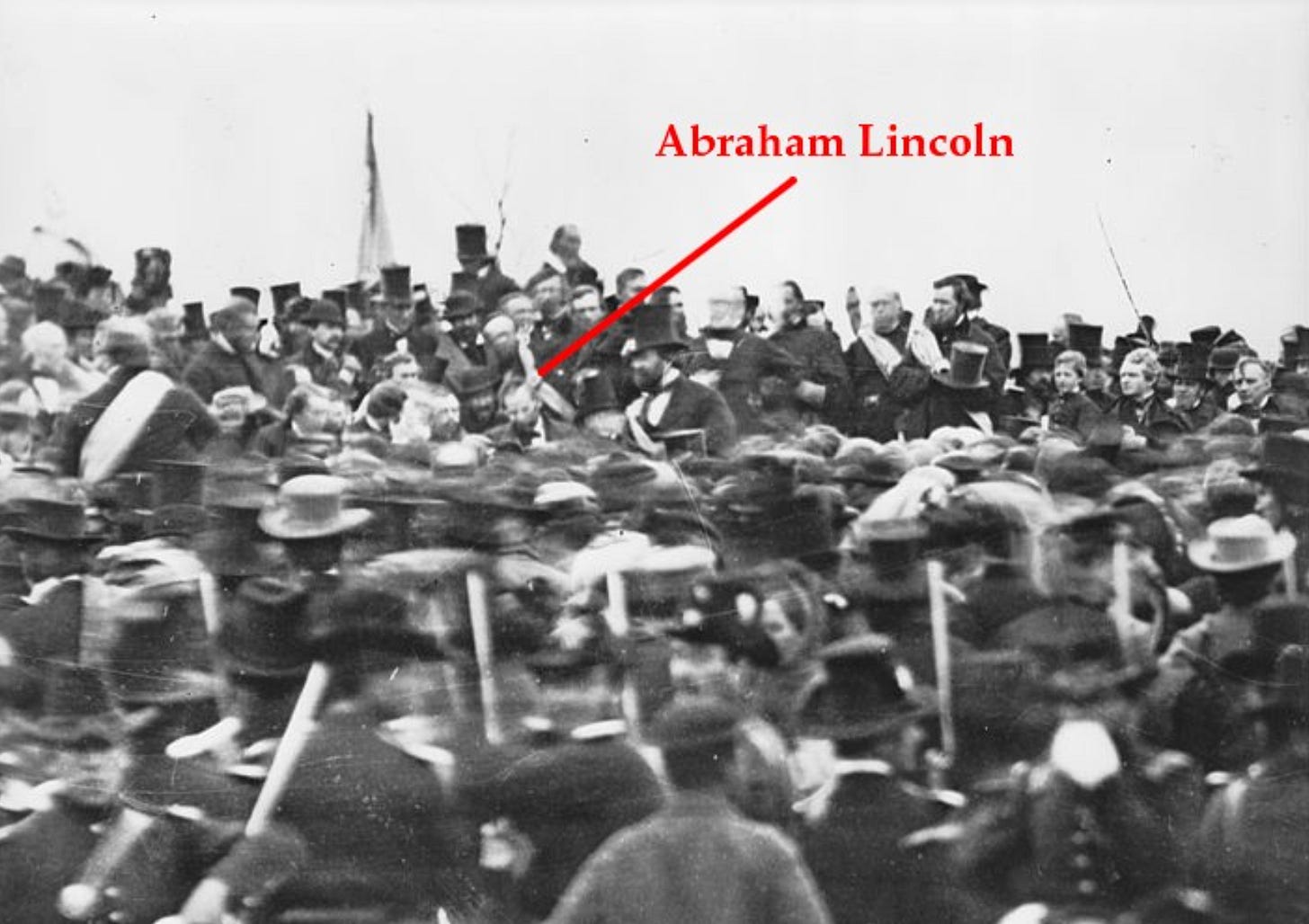To What is the U.S. Government Dedicated?
Reviewing Lincoln's "Gettysburg Address" on the 162nd anniversary of its delivery.
I’ve long thought that Lincoln’s “Gettysburg Address,” which he delivered on November 19, 1863, may be the most succinct and elegant speech ever written. I invariably think about it whenever I’m at a wedding or some other formal occasion and hear a windbag droning on for over five minutes with no structure, theme, or resolution.
Lincoln’s speech is a 272-word masterpiece that he delivered in less than two minutes. It reminds me of Churchill’s remark (if I remember it correctly): “If you want me to give a five-minute speech, I need a week to prepare. If you want me to give a two-hour speech, I can start right now.”
The occasion was the formal dedication of the Soldiers’ National Cemetery, now known as Gettysburg National Cemetery, on the field where the Battle of Gettysburg was fought four months earlier, between July 1 and July 3, 1863, in Gettysburg, Pennsylvania. It was considered a Union victory because Union soldiers repelled the Confederate army and sent it packing, thereby ending General Lee’s northern offensive.
The battle was the Civil War’s bloodiest, resulting in more than 50,000 Confederate and Union army casualties. 3,155 Union soldiers were killed; 3,903 Confederate soldiers died. Tens of thousands of others suffered horrible injuries that required limb amputations.
My great, great grandfather, William Reid Wilson, was a surgeon in the Confederate army, and he kept a diary in which he described performing amputations for hours on end after big battles. It was a gruesome and harrowing job, and in one memorable passage he described a field tent filled with horribly wounded and shrieking men as resembling “one of the lower circles of hell depicted in Dante’s Inferno.”
Dedicating the cemetery was as weighty as it gets, and President Lincoln came prepared.
Four score and seven years ago our fathers brought forth on this continent, a new nation, conceived in Liberty, and dedicated to the proposition that all men are created equal.
Now we are engaged in a great civil war, testing whether that nation, or any nation so conceived and so dedicated, can long endure. We are met on a great battle-field of that war. We have come to dedicate a portion of that field, as a final resting place for those who here gave their lives that that nation might live. It is altogether fitting and proper that we should do this.
But, in a larger sense, we can not dedicate—we can not consecrate—we can not hallow—this ground. The brave men, living and dead, who struggled here, have consecrated it, far above our poor power to add or detract. The world will little note, nor long remember what we say here, but it can never forget what they did here. It is for us the living, rather, to be dedicated here to the unfinished work which they who fought here have thus far so nobly advanced. It is rather for us to be here dedicated to the great task remaining before us—that from these honored dead we take increased devotion to that cause for which they gave the last full measure of devotion—that we here highly resolve that these dead shall not have died in vain—that this nation, under God, shall have a new birth of freedom—and that government of the people, by the people, for the people, shall not perish from the earth.
The opening paragraph emphasizes the idea of birth with the words “brought forth” and “conceived,” with this birth being dedicated to an ideal.
The second paragraph emphasizes that the life that was brought forth is imperiled by civil war and may not survive.
The third paragraph exhorts the living to dedicate themselves to the great task of preserving our government of the people, by the people, for the people so that it shall not perish.
During the last five years, I’ve often thought about Lincoln’s speech and wondered to what our U.S. government is now dedicated.
If President Lincoln and Generals Grant and Lee were transported in time to Washington D.C. today, what would they think about the proceedings of our government?
I dare say they wouldn’t believe their eyes, but would think that what they are seeing is an impossibly vulgar and appalling joke.
Lincoln and Grant would doubtless wonder if what they’d fought for had indeed survived. Lee would feel vindicated for his decision to fight on the side of Secessionists.
With the exception of Thomas Massie and a few other brave souls, our U.S. government now seems entirely dedicated to enriching, aggrandizing, and protecting its rich and corrupt friends.
The Roman lawyer and statesman Cicero is said to have joked that “Rome is made of marble but built on a sewer.” I dare say the U.S. government is a sewer.




Great post John. I believe Lincoln would consider Washington DC a horrible nightmare were he to experience it today. In my opinion it is the most corrupt place on earth. That is certainly an arguable distinction but my case rests on the staggering pretension and hypocrisy of the place, that layered on top of its utter corruption. Nothing is what is appears to be. Everything is cloaked. The media presents it as a serious place, with one side fighting for the average citizen and the other side in opposition. It is all illusion of the most grotesque kind. I believe the average American has no idea how evil the government of this nation has become. Washington DC is ruled by Baphomet. No mistake
I have commented elsewhere, that if God opened a chasm in his Earth and swallowed Washington DC whole, that America would be better for it. Rhetorical hyperbole but I believe it would be true.